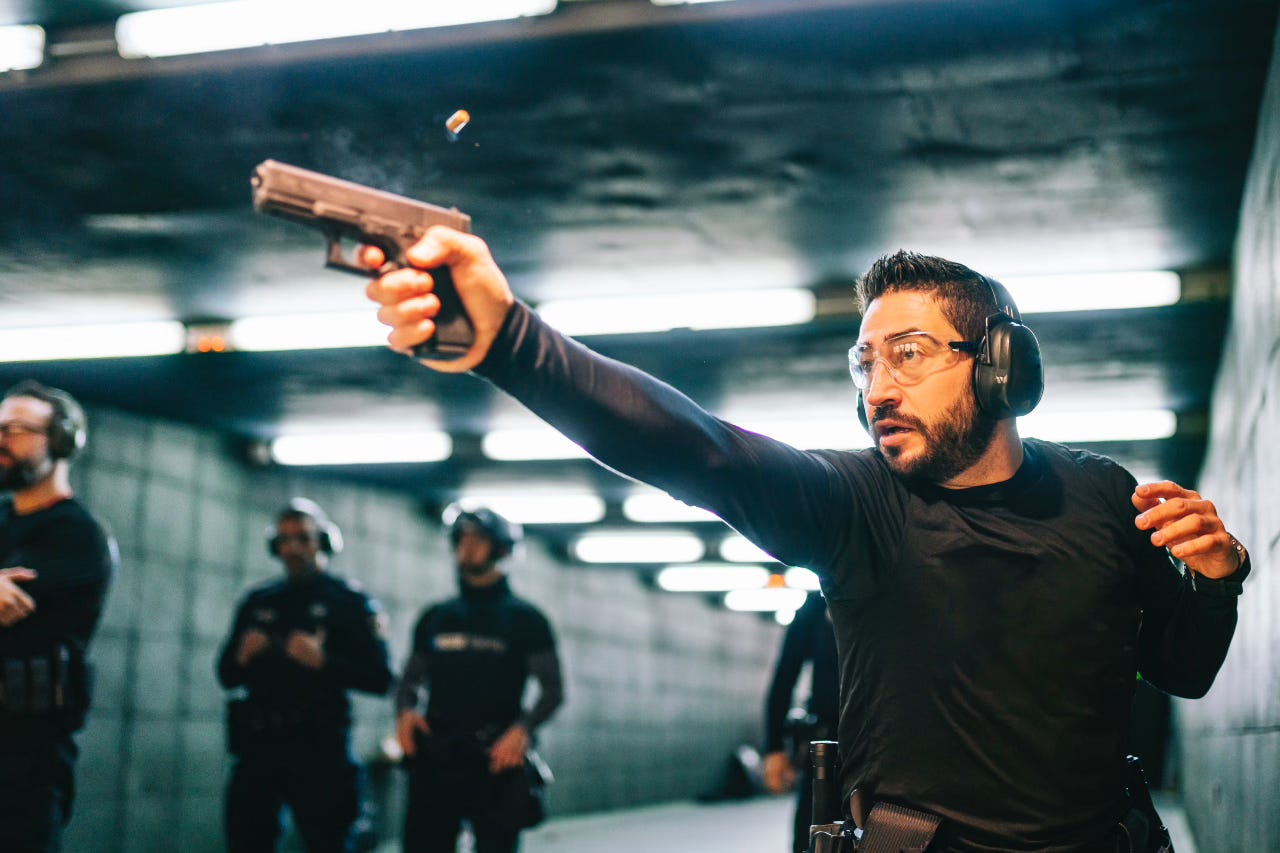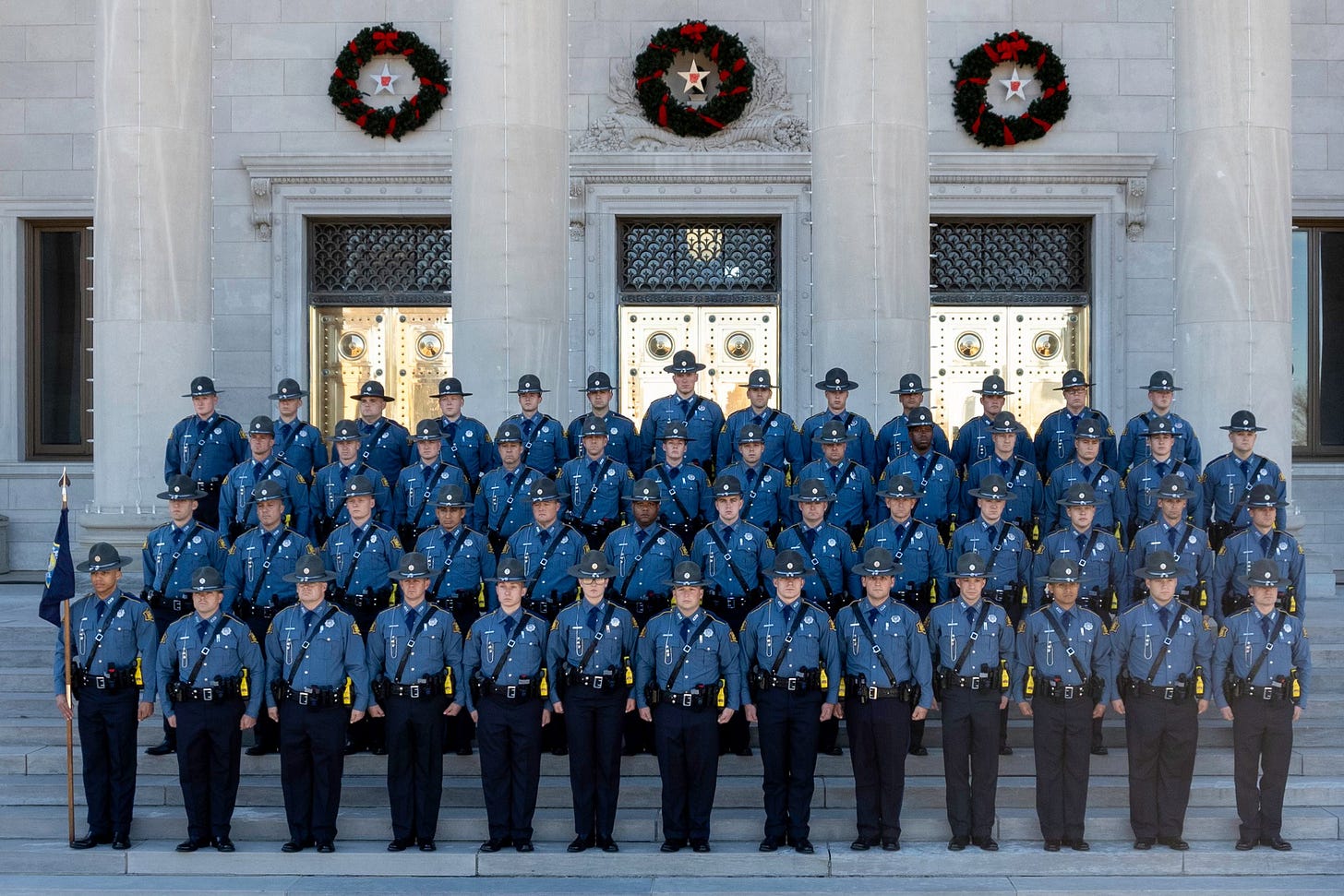The Need to Fail
The cultural flaw where everyone passes has poisoned our well. Declining standards and diminished allure IS the police recruitment crisis.

I don’t paint frequently enough to be good at it. Spraying from a rattle can, it doesn’t take long until I have a run. My first course of action is to spray more paint to fix it. But additional paint will never solve the problem of too much paint. When I’m painting, it doesn’t seem counterintuitive, but it always does in retrospect. Seeing police hiring initiatives on social media, there is the same level of backward logic. If the old way still worked, we wouldn’t be in the situation we find ourselves in 2024.
Diminished Allure
The armed forces are experiencing a recruiting crisis of their own with a notable exception. The Army is offering up to $50K in signing bonuses. The Marine Corp met its quota without offering financial incentives.
General Eric Smith who serves as the 39th commandant says “…your bonus is that you get to call yourself a United States Marine.”
Law enforcement has been working on a flawed idea regarding the current recruiting crisis and no voice addresses this as competently as Dr. Travis Yates . Recruiters, command staff, and so-called experts have made their case, blaming everyone but themselves and attributing failed hiring goals to a generation gap, a lack of qualified candidates and changing social norms. The betrayal of the American Peace Officer was the most damaging factor in drawing officers from families steeped in public service. Children of police officers would have their law enforcement career planned in primary school.
The wrong direction

We have been going in the wrong direction. By opening the profession to a broader portion of the population that lacks a natural aptitude, we have caused the allure to diminish to those with the greatest prospect to succeed in training and thrive in the career until retirement. Our actions are our message and today we are telling them that anyone can be a police officer.
Even if you have past arrests, even if you have drug use issues, even if we need to lower the reading standard, even if we need to drastically lower our physical standards. The women and men with a calling to the profession are taking a pass, and the mentors they trust are telling them to find something else.
We used to tell our target recruiting body that you had to be someone special to become an officer. We used to tell them that we were asking them to do a job that few could do. We promised to test them again and again, then provide fresh new challenges.
In defensive tactics, many techniques are trained, and they are useful, beneficial, and often necessary, but they’re all worthless on an officer who quits during training and will quit during a struggle with a suspect.
We need to fail
We need to break the curse of writing performance evaluations where everyone gets a meets-standards or exceeds-standards. You can’t walk into a roll call meeting without hearing someone displaying a bad attitude. If they are that toxic in the presence of their supervisor, imagine their interactions on the street when the bodycam is off. It will require a lot of courage to be the first line supervisor who gives an officer a deficient evaluation to an 18-year cop who hasn’t received any constructive feedback on hers or his last 36 reviews.
A couple of academy recruits had failed their first two exams and were terminated and being walked out. The one fellow I’d known for years and he tried to dismiss as unimportant the ‘Dealing with Persons with Disabilities’ block of training. He made another poor choice expecting sympathy from me.
We need to fail officers in their annual block training. For years we have cheated officers with ‘check the box’ training. No training course should have a 100% pass rate. Let there be consequences where, depending on the case, the officer is off the road or can’t work off duty extra pay details until they successfully complete remedial training. In defensive tactics, techniques are trained, and they are useful, beneficial, and often necessary, but they’re all worthless on an officer who quits during training and will quit during a struggle with a suspect.
My agency had exceptional firearms training that exceeded state shooting course standards in a state-of-the-art indoor range. Officers would qualify, depending on the year two to four times, and the stress was real. One officer, a gun enthusiast and avid hunter, told me he stressed so much that he didn’t sleep the nights before qualifying. Command staff asked me to do a report on all of officer involved shootings for the previous twelve years. Of all the cases, in only two occasions a suspect wasn’t hit. The first case was the prosecuted criminally and the other was an accidental discharge during a foot pursuit. Valuable training pays off and the officers receiving it are safer for it.
Stop lying to ourselves
The first big lie is a lack of ideal candidates for policing. They exist but they have an aversion to the nature of the profession. There are more than enough candidates for law enforcement careers. If you doubt this, check out Dr. Yates recent podcast with Jake Peters of Safeguard Recruiting. The link is in the references below.
The diversity, equity, and inclusion (DEI) initiatives have been detrimental in hiring adequate staffing. The second big lie is that there aren’t enough females and minorities in policing. Efforts to justify a focus on hiring women barely hides the accusation that contemporary efforts to deprive female of law enforcement careers has been taking place in the major agencies in the country.
Women in command roles are present in nearly all the 79 members of the Major Cities Chiefs Association (MCCA.) However, in a hiring crisis, there’s no time for distracting projects like the 30 X 30 Initiative. This effort ostensibly works toward a law enforcement roster of 30% females by 2030. Reasonable people would expect MCCA to state proudly that their members haven’t practiced gender discrimination in recent decades. The same is certainly true of the state and regional policing organizations in the United States.
Ideal candidates are an amazing mix of women and men who seek a challenge and desire to be the best in their work. There are more than enough in our current national workforce to adopt policing as their professional vocation. But we won’t even get them to consider until we restore the allure. Their families won’t be on board until we see leadership supporting their officers.
We need to fail. We need earnest accountability included in efforts to increase transparency. People not suited for the profession need to be washed out in the academy and field training before we waste any more of their time. We’ll free up the budget dollars to hire the folks better suited. If we keep those folks, we’re not doing them any favors. My friend was a midnight shift sergeant who had an officer who wouldn’t do any proactive policing. The officer went to every dispatched call but wouldn’t stop suspicious people because “it’s not worth it to me.”
Policing will never be tragedy free. The profession will always be dangerous and risky. Because if it was easy, anybody could do it.
Please keep all our law enforcement professionals in your prayers.
References:
https://www.goarmy.com/benefits/while-you-serve/bonuses.html
https://majorcitieschiefs.com






https://open.substack.com/pub/jeffdaukas/p/the-mudslide-of-expectations?r=23tnkl&utm_medium=ios&utm_campaign=post
I completely agree 100%! I wrote the above article on January 25 of 2023, and the echoes are more adequately explained by Roland in his article here! The need for excellence is not just a pipe dream and we need to stop treating it like an unattainable unicorn. When I teach at the police Academy, I am challenging the recruits to do better than what they think their best day could look like every single day. And you know what? They respond and perform! Too bad lackluster cowardice through leadership stymies that innovation, creativity, and drive as officers go through their career.
Excellent piece!